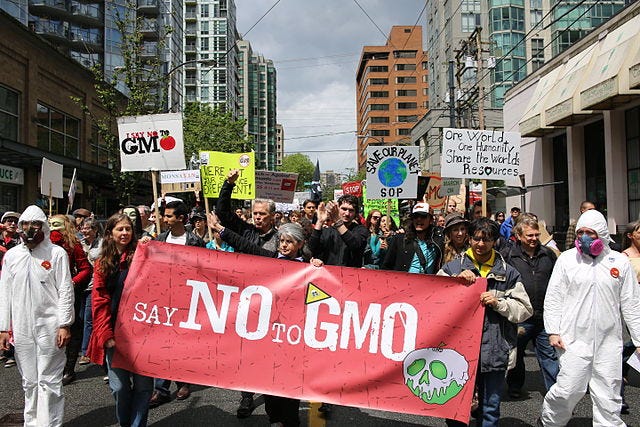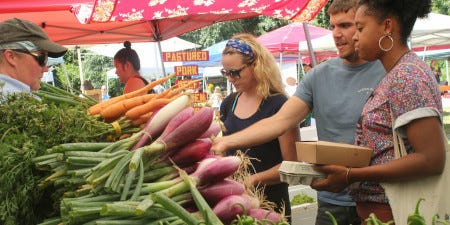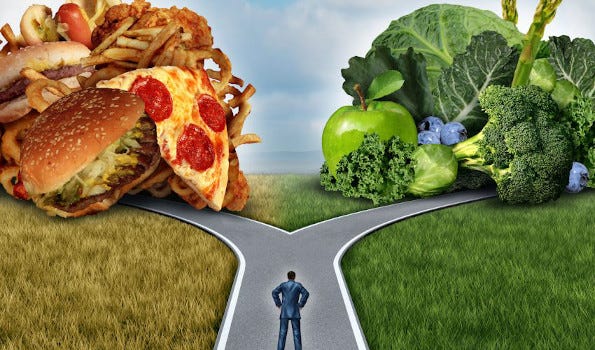The Future of Food (Is Ours to Decide)
by James Corbett
corbettreport.com
January 29, 2023
From GMOs and lab-grown meat to the "Eat Ze Bugs" agenda and molecular gastronomy, readers of What is the Future of Food? will know that the global cabal is busy cooking up nefarious plans for reengineering our food supply.
And, as readers of Who Is Behind the Great Food Reset? will know, that global cabal includes the usual suspects—the Rockefellers, the Gates, the World Economic Forum—as well as upstarts like the EAT Forum. (And let's not forget BlackRock!)
But for those looking to avoid the creepy culinary concoctions of the Great Food Resetters, that still leaves the question: what do we do about this agenda?
Answering that question is our task for today.
THE PUSHBACK
If there is any good news to be had in the sad saga of future (fake) food, it's that the people are waking up to the Great Food Reset agenda and they are not happy about it.
For a trivial example of the pushback against the fake food agenda and the oligarchs stewarding over it, witness Bill Gates' recent "AMA" (ask me anything) thread on reddit, where one heavily upvoted question put the issue to America's largest farmland owner directly:
Why are you buying up so much farmland, do you think this is a problem with billionaire wealth and how much you can disproportionally acquire? [sic]
Gates' answer—employing the fact checkers' ACKSHUALLY! by pointing out that he "own[s] less than 1/4000 of the farmland in the US [sic]" and that his only interest in farms is "to make them more productive and create more jobs"—is to be expected from a man who has spent billions on PR and propaganda in recent decades to transform his public image from that a reviled tech monopolist to that of a revered billionaire philanthropist.
The response to that answer, however—observing that 1/4,000 of US farmland is still an incredibly large amount of land and that Gates did not explain how consolidation of farmland in fewer hands will transform the agricultural sector—shows that the public is not buying Gates' PR wholesale anymore.
A less trivial example of the pushback against Gates and his ilk is to be found in the "Open Letter to Bill Gates on Food, Farming, and Africa" published last November and signed by no less than 50 organizations dedicated to food sovereignty, including the Community Alliance for Global Justice/AGRA Watch and the Alliance for Food Sovereignty in Africa. The letter derides Gates' role in "creating the very problem" of global food shortages that he is ostensibly "fixing," accusing him of pushing ineffective (but profitable) technocratic solutions instead of simpler, less expensive agricultural solutions:
There are already many tangible, ongoing proposals and projects that work to boost productivity and food security—from biofertilizer and biopesticide manufacturing facilities, to agroecological farmer training programs, to experimentation with new water and soil management techniques, low-input farming systems, and pest-deterring plant species. What you are doing here is gaslighting—presenting practical, ongoing, farmer-led solutions as somehow fanciful or ridiculous, while presenting your own preferred approaches as pragmatic. Yet it is your preferred high-tech solutions, including genetic engineering, new breeding technologies, and now digital agriculture, that have in fact consistently failed to reduce hunger or increase food access as promised.
The pushback against the transformation of the food supply is not limited to Gates and his eponymous foundation's efforts, however.
Resistance against GMO foods, for instance, is massive. In fact, the more the biotech billionaires try to shove their genetically modified monstrosities on vast swaths of the human population, the more the public is rising up to reject them. In recent months alone we have seen people rebelling against GMOs in Turkey, Kenya, Nigeria, Mexico, Pakistan and Indonesia.
All of these protests against the Great Food Reset are hopeful signs. They show that the public are not simply going to swallow anything that is put on their plate. But even more important than these examples of protest and pushback are the things that we can do to take the Future of Food away from the agribusiness conspirators and their bought-and-paid-for politicians and put it back in the hands of the people.
BEYOND PUSHBACK
Yes, open letters to Bill Gates and protests against the introduction of GMOs and similar examples of pushback against the transformation of the food supply are encouraging proofs that "we the people" are ready to stand up to the agribusiness mafia and the biotech billionaires and the food chain false flaggers. But let's be clear on one point: we are not going to fundamentally derail this future food agenda merely by appealing to government regulators or asking the oligarchs to be kind to us.
Lest we need reminding of why such tactics are insufficient for achieving real change, here is a smattering of headlines from recent months that make it crystal clear that the entire agribusiness oligopoly and the "regulators" who supposedly keep them in check are one and the same:
Environmental activists protest ex-Syngenta CEO’s appointment as advisor
EU coaches GMO industry on how to gain support for deregulating GMOs
Majority of members of UK's new GMO regulatory committee have conflicts of interest
No, protests, open letters and appeals to government are not "the" answer to the engineered food crisis we are facing. They are useful for buying us time while we make good our escape from the global industrial agricultural system, but therein lies the real point. To stand any chance of avoiding the bug burgers and synthetic sorbet of the would-be food tyrants, we have to escape from the corporate industrial food conveyor belt that has allowed our food supply to be centralized and monopolized in the first place.
Thankfully, contrary to the propaganda of the (Gates/Rockefeller-sponsored) "Green Revolution," we do not need to rely on expensive, patented technologies or exotic laboratory techniques to feed the world. The knowledge of how to work with nature rather than against it existed long before the current crop of agribusiness technocrats came along. The tools for reaping the natural abundance of the earth are already in our hands.
In 2017, the ETC Group—an independent, donor-funded research organization that "monitors the impact of emerging technologies and corporate strategies on biodiversity, agriculture and human rights"—released "Who Will Feed Us? The Industrial Food Chain vs the Peasant Food Web." This report painstakingly debunks the myth propagated by the food oligarchs that only modern, capital-intensive, technological farming methods can produce the amount of food needed to feed the world.
Instead, the study demonstrates that the "peasant food web"—the diverse network of small-scale producers disconnected from Big Ag—actually feeds 70% of the world's population using only 25% of the world's agricultural resources. The report concludes: "[A]t least 3.9 billion people are either hungry or malnourished because the Industrial Food Chain is too distorted, vastly too expensive, and—after 70 years of trying—just can’t scale up to feed the world."
Although (clearly biased, poorly argued) "rebuttals" of the ETC Group's conclusions have been published by the usual suspects, the real sign of the power of small producers to stand up to the Big Ag oligarchs is that those same oligarchs are trying to hijack the Peasant Food Web itself and use it to further their own goals. There is much to be said, after all, about the rise of agroecology in recent years and how "the study of the relation of agricultural crops and environment" is now being weaponized by the Committee on World Food Security and similar globalist organizations as a way to promote "sustainable" agricultural practices (like shutting down small farmers in the Netherlands and Sri Lanka and elsewhere).
But for the purposes of today's exploration, it is important merely to understand that the myth that we have to rely on the Big Ag plutocrats to feed the world is just that: a myth.
It is a myth that perpetuates the industrial farming system.
It is a myth that has allowed a corporate cartel to centralize our entire food supply in the hands of a few oligarchs, thereby giving them the power to reengineer that food supply at will.
And, worst of all, it is a myth that has kept us from recognizing the most important fact of all: the future of our food supply is not written in stone. The replacement of our food with synthetic, lab-made gunk is not a fait accomplis.
As it turns out, the Davos Man jet set and their corporate cronies and philanthrocapitalist pals do not wield complete control over the earth (yet). There is still a part for us to play in deciding how the future of food unfolds.
THE FUTURE IS OURS TO DECIDE
If our goal is not to fall into the carefully laid traps of the culinary cartel, here is the first thing we can do: we can (for the time being, at least) choose to avoid their fake foods.
This may seem like an obvious point, but it is nonetheless important to remember. Our choices do matter and we can forestall the food takeover by opting out (even partially) of the corporate food system.
For a perfect case in point of this deceptively simple observation, we need look no further than the story of "Posilac," Monsanto's genetically engineered recombinant bovine growth hormone (rBGH), which was injected into dairy cows to increase milk production. Posilac was (unsurprisingly) approved by the FDA despite the fact that the milk from Posilac-treated cows contained pus and antibiotics from the mastitis caused by the hormone, and it had as much as ten times the levels of IGF-1 (Insulin-like Growth Factor) as regular milk.
But the rBGH-laden milk from the Posilac-treated cows did not last on store shelves for long. Pressured by the public, FDA inspectors were forced to admit the contamination in the rBGH milk, and Monsanto was compelled to reduce the Posilac supply by 50%.
Consumers did not stop there. Over the following years, a grassroots consumer campaign emerged to demand rBGH-free milk. These consumers continued to demand it and demand it and demand it . . . until they got it.
By 2010, two-thirds of the Top 100 producers had switched to rBGH-free dairy production. From then on, rBGH-free milk was proudly labeled as such, and major retailers began taking rBGH milk off their shelves due to overwhelming consumer pressure. Today, rBGH milk, once nearly ubiquitous across America, is a rarity on store shelves.
There are signs that a similar phenomenon is playing out with the fake meat agenda. In fact, the bottom has already started to fall out of the lab-engineered, cell-cultured fake meat industry, with even Bloomberg admitting that the fake meat trend is a fad whose 15 minutes in the spotlight may be just about up. Supermarket sales of fake meat were down 14% last year, fake meat restaurant sales down 9% from three years ago and, during the worst of the scamdemic food shortages, many people were quick to point out that the only meat left on the supermarket shelves was the fake meat that the public evidently does not want.
These stories are important because they underline an incredibly important point: our choices matter. We make choices each and every day about where we buy our foods, who we buy them from and what we ultimately allow in our body. It is not a perfect power: monetary constraints and the lack of transparency that has been baked into our existing food system means that we do not exercise total control over our dinner plate, but the power that we do have is important and it does make a difference.
Beyond our role as consumers, however, we also have a role to play in building up the "Peasant Food Web" that will form the basis of any true alternative to the overly-processed synthetic foodstuffs of the industrial food system. There are many, many ways to do this.
We can engage in urban gardening.
We can plant our own victory gardens.
We can study permaculture design and learn about food forests to discover how to reap the natural abundance of the earth.
We can explore REKO Rings, Farm Shares and Farmer Bazaars.
We can start (or support) guerilla gardening.
We can avail ourselves of the tools for finding and sourcing local growers and free food.
None of these are total solutions. None of them will help us achieve 100% food sovereignty overnight. But every step we can take toward finding, sourcing, supporting and growing the space for fresh, organic food is a victory. Even a baby step away from the supermarket and toward the farmer's market is a baby step in the right direction, and it helps us prepare for the day when we will be forced to either Eat Ze Bugs or make do for ourselves.
Whatever the case, it is imperative that we start engaging in the many, many solutions on offer now. Whether one understands the machinations of the Food Resetters or not, there can be no doubt that there is a food crisis coming. Indeed, there will be a point in the future when—because of "cyber attacks" or war or geoengineering or scamdemics or "mysterious fires" at food processing facilities or any of a million other engineered or fabricated emergencies—the global food supply will be strained to its breaking point. And who can doubt that at that moment of crisis the oligarchs will press their advantage and foist their synthetic foods on the public as the "solution" to the problem they have created?
CONCLUSION
For those who believe that the grotesque visions of culinary dystopia being proffered in this series on The Future of Food are merely warnings of what may one day come to pass, it is time to wake up and face facts. The Future of Food nightmare is not coming. It is already here.
In case you missed it, the EU just approved the use of "partially defatted cricket powder" as a "novel food" for human consumption.
India has just approved genetically engineered mustard for commercial cultivation despite a report showing that no health expert participated in the regulatory process.
Small farmers are already rising up around the world as governments crack down on their operations in the name of "saving the environment."
This global food transformation is already happening. And if we merely maintain the status quo, dutifully eating whatever is put on our plate, then the global oligarchy will get their way and we will all be eating garbage.
So, the next time you're at the grocery store staring at a packet of processed foodstuff that may or may not contain GMOs or processed bug powder or fake meat or any of this other Frankenfood, ask yourself:
What does it mean that the Great Food Reset crew want you to Eat Ze Bugs?
What does it mean that they are serving you dog food?
What does it meant that they want you to drink your own urine?
What does it mean that they want you to eat literal garbage?
And, if it is true that we are what we eat, then what are they trying to turn us into?
When all is said and done, let's keep in mind what's really on the table here: the future of humanity itself.
And, remember, if the journey of a thousand miles begins with a single step, then the journey of an agricultural revival begins with a single seed. (An unpatented, heirloom, non-GMO seed, that is.)







